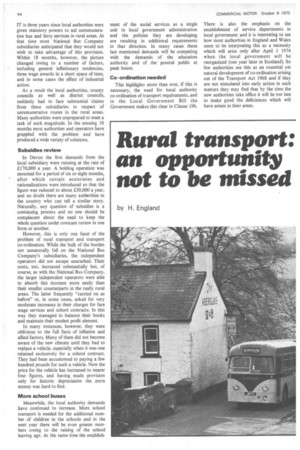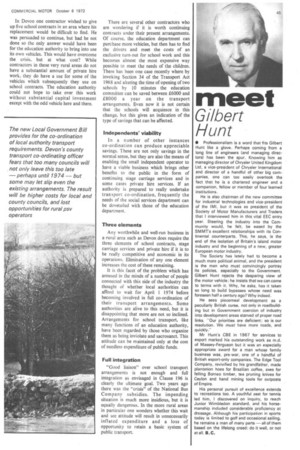Rural transport: an opportunity not to be missed
Page 46

Page 47

If you've noticed an error in this article please click here to report it so we can fix it.
IT is three years since local authorities were given statutory powers to aid unremunerative bus and ferry services in rural areas. At that time most National Bus Company subsidiaries anticipated that they would not wish to take advantage of this provision. Within 18 months, however, the picture changed owing to a number of factors, including general inflationary tendencies, three wage awards in a short space of time, and in some cases the effect of industrial action.
As a result the local authorities, county councils as well as district councils, suddenly had to face substantial claims from these subsidiaries in respect of unremunerative routes in the rural areas. Many authorities were unprepared to meet a task of such magnitude. In the ensuing 18 months most authorities and operators have grappled with the problem and have produced a wide variety of solutions.
Subsidies review In Devon the first demands from the local subsidiary were running at the rate of £170,000 a year. A holding operation was mounted for a period of six or eight months, after which certain economies and rationalizations were introduced so that the figure was reduced to about £20,000 a year, and no doubt there are many authorities in the country who can tell a similar story. Naturally, any question of subsidies is a continuing process and no one should be complacent about the need to keep the whole question under constant review in one form or another.
However, this is only one facet of the problem of rural transport and transport co-ordination. While the bulk of the burden not unnaturally fell on the National Bus Company's subsidiaries, the independent operators did not escape unscathed. Their costs, too, increased substantially but, of course, as with the National Bus Company, the larger independent operators were able to absorb this increase more easily than their smaller counterparts in the really rural areas. The latter frequently "carried on as before" or, in some cases, asked for very moderate increases in their charges for fare stage services and school contracts. In this way they managed to balance their books and maintain their modest profit element.
In many instances, however, they were oblivious to the full, facts of inflation and allied factors. Many of them did not become aware of the new climate until they had to replace a vehicle, especially when it was one retained exclusively for a school contract. They had been accustomed to paying a few hundred pounds for such a vehicle. Now the price for the vehicle has increased to nearer four figures, and having made provision only for historic depreciation the extra money was hard to find.
More school buses
Meanwhile, the local authority demands have continued to increase. More school transport is needed for the additional number of children in the schools and in the next year there will be even greater numbers owing to the raising of the school leaving age. At the same time the establish
ment of the social services as a single unit in local government administration and the policies they are developing are resulting in additional requirements in that direction. In many cases these last mentioned demands will be competing with the demands of the education authority and of the• general public at peak hours.
Co—ordination needed This highlights more than ever, if this is necessary, the need for local authority co-ordination of transport requirements, and in the Local Government Bill the Government makes this clear in Clause 196. There is also the emphasis on the establishment of service departments in local government and it is interesting to see how most authorities in England and Wales seem to be interpreting this as a necessity which will arise only after April 1 1974 when the local government will be reorganized (one year later in Scotland). So few authorities see this as an essential yet natural development of co-ordination arising out of the Transport Act 1968 and if they are not stimulated into early action in such matters they may find that by the time the new authorities take office it will be too late to make good the deficiences which will have arisen in their areas. In Devon one contractor wished to give up five school contracts in an area where his replacement would be difficult to find. He was persuaded to continue, but had he not done so the only answer would have been for the education authority to bring into use its own vehicles. This would have overcome the crisis, but at what cost? While contractors in these very rural areas do not have a substantial• amount of private hire work, they do have a use for some of the vehicles which subsequently they use on school contracts. The education authority could not hope to take over this work without substantial capital investment except with the odd vehicle here and there.
There are several other contractors who are wondering if it is worth continuing contracts under their present arrangements. Of course. the education department can purchase more vehicles, but then has to find the drivers and meet the costs of an exclusive turn-out for school work and this becomes almost the most expensive way possible to meet the needs of the children. There has been one case recently where by invoking Section 34 of the Transport Act 1968 and altering the time of opening of two schools by 10 minutes the education committee can be saved between £6000 and £8000 a year on the transport arrangements. Even now it is not certain that the schools will acquiesce in this change. but this gives an indication of the type of savings that can be affected.
Independents' viability In a number of other instances co-ordination can produce appreciable savings. These are not only savings in the normal sense, but they are also the means of enabling the small independent operator to have a viable business which brings other benefits to the public in the form of continuing stage carriage services and in some cases private hire services. If an authority is prepared to really undertake transport co-ordination, frequently the needs of the social services department can be dovetailed with those of the education department.
Three elements
Any worthwhile and well-run business in a rural area such as Devon does require the three elements of school contracts, stage carriage services and private hire if it is to be really competitive and economic in its operations, Elimination of any one element increases the cost of these remaining.
It is this facet of the problem which has aroused in the minds of a number of people connected with this side of the industry the thought of whether local authorities can afford to wait for April 1 1974 before becoming involved in full co-ordination of their transport arrangements. Some authorities are alive to this need, but it is disappointing that more are not so inclined. Arrangements for school transport, like many functions of an education authority, have been regarded by those who organize them as being inviolate and sacrosanct. This attitude can be maintained only at the cost of needless expenditure of public funds.
Full integration "Good liaison" over school transport arrangements is not enough and full integration as envisaged in Clause 196 is clearly the ultimate goal. Two years ago there was the "crisis" of the National Bus Company subsidies. The impending situation is much more insidious, but it is equally dangerous. In the more rural areas in particular one wonders whether this wait and see attitude will result in unnecessarily inflated expenditure and a loss of opportunity to retain a basic system of public transport.






































































































